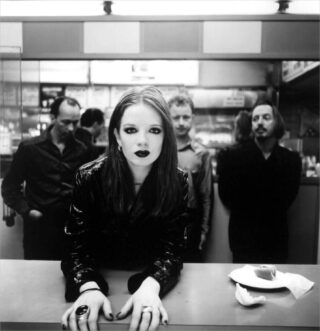Primer playlist: a listening guide to Garbage
A voyage into the back catalogue of Shirley Manson and co's influential, genre-splicing group Garbage

A voyage into the back catalogue of Shirley Manson and co's influential, genre-splicing group Garbage
Duke Erikson, Steve Marker and Butch Vig had been musical collaborators for several years prior to the formation of Garbage, building careers as sought-after musicians, engineers and producers. Vig was riding high on the success that followed his production of Nirvana’s seminal Nevermind, while Marker and Erikson had remixed for bands like Depeche Mode and Nine Inch Nails. The three were mutually inspired by this work, and wanted to translate their shared interests into a band set up; for this, they sought an understated female vocalist.
Marker discovered formidable Scottish singer Shirley Manson after watching her band Angelfish on MTV’s alternative music show 120 Minutes. The trio got in contact with her from the States, and invited her to audition for the new band, soon to be called Garbage. The sessions that followed formed the basis of what became Garbage’s self-titled debut album.
As an intentional response to the grunge Vig was associated with, Garbage set out to make music that represented a melting pot of genres with a pop sensibility front and centre throughout. The 1995 debut fused everything that was popular at the time together, fed it through the genius production machine of the US members along with Manson’s wicked charm, and regurgitated out a sound that was so weird but so relatable beneath the exterior. They took trip-hop, post-grunge, female angst and the ego of Britpop, and created an intelligent 12-track record that included decade-defining hits like ‘Only Happy When It Rains’ and ‘Stupid Girl’. Elsewhere, tracks like ’As Heaven Is Wide’ and ‘Vow’ truly speak to Garbage’s signature, chainsaw-like production style that’s intense and oversaturated, paired with Manson’s breathy vocal and demonic lyricism. Beneath the sacrilege are the moments of more spacious beauty which Garbage have always managed to balance expertly with their noisier tendencies, such as hazy album closer ‘Milk’.
1998’s Version 2.0 took a different approach, with breakbeats and techno samples driving most of the tracks. These are rock songs at the core, encased in an eccentric take on electronic music. Lead singles ‘I Think I’m Paranoid’ and ‘Push It’ are uncomplicated and in-your-face industrial rock hits with massive, seething choruses, elements which are pushed even further on the record’s real mean machine ’Dumb’. Version 2.0 might have been critically acclaimed (earning the band four Grammy nominations), but it still feels underrated as a masterpiece of electronic music (for more evidence, check out the techno lullaby of ‘Hammering in My Head’ and the soft, seductive trance of ‘Sleep Together’).
2001’s Beautiful Garbage marked another chameleonic change. It’s an album that’s reflective of the mismatched quirks that now make Y2K nostalgia so alluring: see the R&B fusion of ‘Androgyny’, the funk swagger of ’Shut Your Mouth’, or the sugary-sweet queer anthem ‘Cherry Lips (Go Baby Go)’, on which Manson emulates Kylie Minogue. In theory, the doo-wop of ‘Can’t Cry These Tears’ doesn’t make much sense when paired with the musical theatre-esque ‘Till the Day I Die’, the clamouring blues rock of ‘Silence Is Golden’ and futuristic indie pop head spinner ‘Parade’ – but Garbage threw them all together anyway. Beautiful Garbage is unapologetic in its haphazard composition and lyricism.
Faultlines within the band started to grow in the lead-up to fourth record Bleed Like Me, released in 2005, and you can hear them in the tense atmosphere of hard rock hitters ‘Bad Boyfriend’ (ft guest drum spot by Dave Grohl) and ‘Why Do You Love Me’, which sit between the more stripped-back, aching album highlights ‘Bleed Like Me’ and ‘It’s All Over But the Crying’. An on-and-off hiatus followed, before Garbage returned in 2012 with Not Your Kind of People, an album that celebrates and polishes what made the band so popular in the first place. It’s a bright, bold record and one of the best in their catalogue, with standouts including the supercharged robotic electronica of ‘Automatic Systematic Habit’, the monolithic and searing ‘Control’, the hazy shoegaze of ‘Felt’, and the stuttering synth-punk of ‘Man on a Wire’.
2016’s Strange Little Birds saw the band embrace trip hop more than they had done since their debut, as dark and twisty as ever (see ‘If I Lost You’ and ‘Night Drive Loneliness’), which cleared a path for 2017’s single ‘No Horses’, an impactful, unorthodox and dystopian new wave art piece. In 2021 the band released their most left field album yet, No Gods No Masters, a political anatomisation filled with curiosities like punk rager ’The Creeps’ and industrial trip-hop mashup ‘Godhead’. The title track is classic Garbage: a space-age, hook-driven pop song that’s constantly changing pace, guided by Manson’s hallucinogenic vocals.
Three decades on from their formation, Garbage have stood the test of time and cemented themselves as ballsy icons of alternative music. Their tradition of marking album anniversaries with the release of previously unheard deep cuts and B-sides, attests to the devotion they inspire in their audience. True innovators and trailblazers, their focus on applying electronic production techniques to a live band set up has been mesmerising from day one, and they continue to embrace unconventionality and dualities in both music and lyricism.
Spotify
YouTube